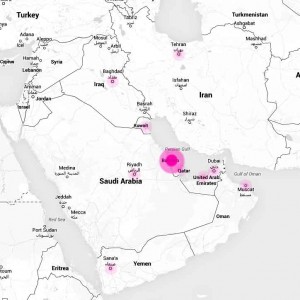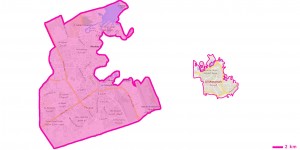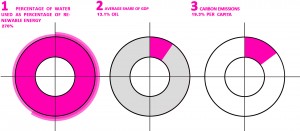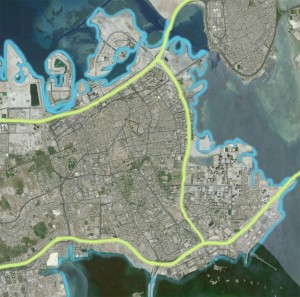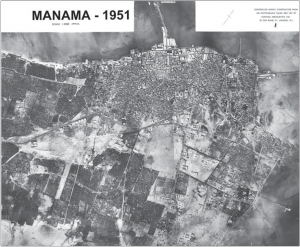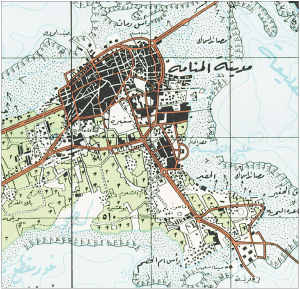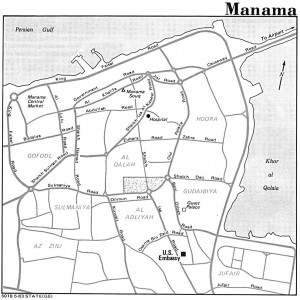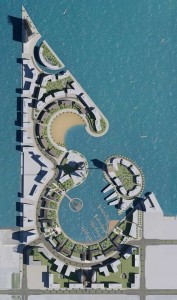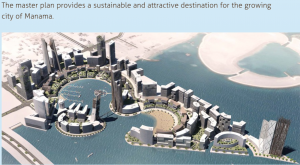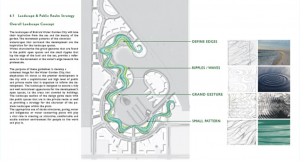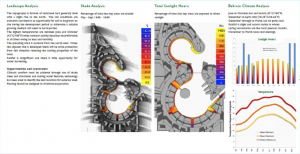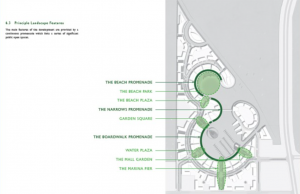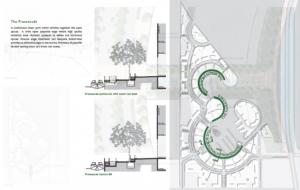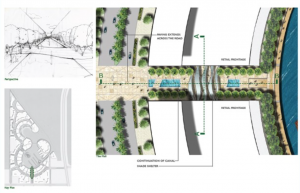“The Place of Rest”²
By Aisha Al-khelaifi
GEOGRAPHICAL LOCATION
DOHA VS. AL MANAMAH
Doha: 132.1 km² Al Manamah: 30 km²
- % OF WATER USED AS PERCENTAGE OF RENEWABLE ENERGY³
- AVERAGE SHARE OF GDP
- PERCENTAGE OF CARBON EMISSIONS
- Longitude: 26°13′00″N
- Latitude: 50°35′00″E
- Altitude: 0 m
- Population: 157,474 (2010)
- Geography: Gulf of Bahrain
- Climate: Arid Climate
- City Type: Capital of Bahrain
Map of Manama year 1968
Map of Manama year 1983
MASTER PLANS
Water Garden City Master Plan⁵
CHALLENGE
At the heart of Manama, the Water Garden City master plan focused on providing a sustainable development of 7,700 residential units; for a residential population of over 40,000 people and with a total area of 340,000 sqm of lettable retail and office space. The client wanted the project to bring together the vibrant elements of water, garden and city.
INNOVATION
The master plan created two new water bodies, the marina and the beach that were linked by an extended promenade to provide an environment for water festivals and other events for which Bahrain is well known. An integrated canal network provided a connection for visitors and residents with the historic foundation of Bahrain’s historic seafaring economy. The landscape and urban design strategies were project managed by Anna Tennent for HOK.
A rigorous environmental analysis was undertaken to ensure that the proposed development met with stringent environmental and green infrastructure criteria.
The urban design strategy focused on making comfortable, attractive and pedestrian orientated destination. The landscape strategy provided a series of new community parks and a beach linked by the promenade; soft and hard landscape palettes and a lighting strategy were developed to support a tidy, safe and well maintained connected environme
IMPACT
The master plan provides a sustainable and attractive destination for the growing city of Manama.
SUSTAINABLE ASPECT
the designers are challenged to provide ecologically sustainable infrastructure, including a gravity sewerage network. The design was cost-effectively achieved with the help of Bentley software.
Impact Assessment was carried out to identify, assess, and address any environmental impacts resulting during the design, construction, and life of the project. Potential impacts considered included hydrodynamic, marine ecology, and sea water quality.
In general, the development was found to have no significant residual impacts. Precautions included design provisions such as oil-interceptors on surface water drains and an irrigation system designed to re-use treated sewage effluent.⁶
FUTURE VISION
Some new project that are in consideration for the future to enhance and start a new era in Al Manamah.
Diyar Al Muharaq

REFERENCES
- Diyar Al Muharaq launch marks new era in urban development. (2008, June 26). . Retrieved June 12, 2014, from http://www.gulf-press.com/english/news.details.php?id=13923
- Room, Adrian (1997). Placenames of the world : origins and meanings of the names for over 5000 natural features, countries, capitals, territories, cities and historic sights. Jefferson, North Carolina: McFarland.
-
Water Availability and Use in the Middle East (Carboun Advocating Sustainable Cities in the Middle East) Retrieved June 12, 2014, http://www.carboun.com/water/water-availability-and-water-use-in-the-arab-world-infographics/#more-2216
- North Manama Causeway Project. (n.d.). . Retrieved June 13, 2014, from http://www.nmcproject.com/index.php?cid=9
- Bahrain Water Garden City. (n.d.). . Retrieved June 14, 2014, from http://www.aliveinspace.com/bahrain-water-garden-city/
- http://ftp2.bentley.com/dist/collateral/docs/case_studies/cs_scott-wilson_water-garden-city-bahrain.pdf

